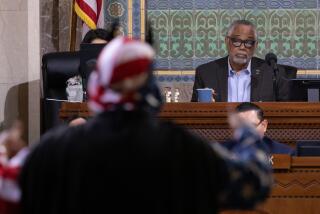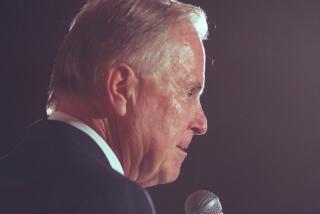Newton: Villaraigosa in his element as ‘the nation’s mayor’
The mayor of Columbus, Ohio, described his “utter disbelief” at the destructive “gamesmanship” as Congress debates the debt ceiling. The mayor of Fresno described her city’s tough budget problems and wondered when the economy would hit bottom. The mayor of Philadelphia spoke for many when he asked of Congress: “What is going on down there?”
Mayor Antonio Villaraigosa, who played host Friday to his colleagues from across the country, listened to the outpouring of frustration and reminded the mayors that they need to continue setting aside their political differences and band together in defense of cities. To a person, they agreed.
Villaraigosa’s appearance topped a busy 36 hours for the mayor. He left Los Angeles at 4 a.m. on Thursday, testified in Washington that afternoon about transportation funding and then flew back to L.A. to visit a city gang program that night and to welcome 50 of his fellow chief executives to town.
In some respects, that’s a fairly typical flurry of activity for L.A.’s peripatetic chief executive: Villaraigosa doesn’t often sit still. But this particular blitz reflected the obligations and opportunities that come with his new post as president of the U.S. Conference of Mayors, a position informally known as “the nation’s mayor.” Since taking office last month, Villaraigosa has jumped right in, delivering a punchy inaugural address, weighing in on national security policy, meeting with President Obama and calling on the federal government to recognize the plight of U.S. cities and to invest in environmentally sensitive infrastructure, especially in the area of transportation.
As that suggests, the new position gives Villaraigosa a platform and a coalition. Now the question is: Will Washington listen?
The president of the conference has at times wielded real clout. The organization successfully lobbied for the creation of Community Development Block Grants, took a forceful stand against the Vietnam War and waged a sustained campaign against South African apartheid, among other issues. Today, the conference is focused on jobs, but it also recently called for an end to the wars in Iraq and Afghanistan (with the idea that the money for those efforts could then be redirected to domestic spending). Since assuming the presidency, Villaraigosa has been a frequent guest on national news programs (broadcasters across the country now have to struggle with pronouncing his unconventional name) and has been quoted well beyond Los Angeles.
The beef against Villaraigosa closer to home is that he’s more of a talker and initiator than a doer or a closer — that he calls for this or that or makes grandiose promises but doesn’t deliver or falls well short of the mark (we’re still waiting on those million trees). But as City Council President Eric Garcetti noted, the mayor’s new position plays to his strengths: “This is what he’s best at … swinging for the fences, stepping up and stepping out.”
All of which is of special importance to Villaraigosa if he’s to craft a political future when his Los Angeles term ends in 2013.
If the presidency is good for Villaraigosa, it’s also potentially good for Los Angeles. Take the mayor’s dogged efforts on behalf of the so-called 30/10 plan, a proposal to use federal money to accelerate local transportation goals and complete 30 years’ worth of projects in a decade, then repay that money using a locally approved sales tax increase. That utterly sensible proposal has run into some irrational Republican skepticism merely because it is the work of a liberal Democrat and would serve the interests of a decidedly liberal city.
In recent months, Villaraigosa has expanded the idea to cover other areas and rechristened it America Fast Forward. Moreover, his allies in the effort now include prominent Republicans, including the conference’s second vice president, Scott Smith, the mayor of Mesa, Ariz. Now when Villaraigosa lobbies for the proposal, it is as the head of a bipartisan coalition that includes 113 U.S. mayors, not just as the mayor of a Democratic bastion. In his testimony Thursday, Villaraigosa emphasized that he spoke “for my fellow mayors around the country, Democrat and Republican.”
The presidency even helps in his relations with the U.S. president. Though Villaraigosa and Obama have never been especially close — Villaraigosa endorsed Hillary Rodham Clinton when she was running against Obama — the mayor now speaks not just for himself but for hundreds of mayors, ensuring him of the president’s attention. Witness his recent audience with Obama. Afterward, Villaraigosa said he’d made the case that the government should not be building hospitals and bridges in Baghdad and Kandahar while ignoring Baltimore and Kansas City; Obama, according to the mayor, agreed that cities need help.
Looking around the table of assembled mayors last week, Villaraigosa stressed that the challenge of cities is not ideological but practical: How to balance budgets and deliver services even as Washington grinds into inaction. “What you see here are mayors, Republican and Democrat,” Villaraigosa said, “who have figured this out.”
More to Read
A cure for the common opinion
Get thought-provoking perspectives with our weekly newsletter.
You may occasionally receive promotional content from the Los Angeles Times.







